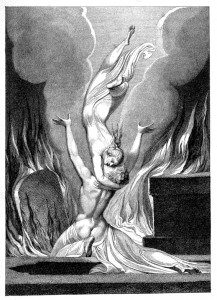On Facebook I just ran across the epigram, “We live two lives. The second begins when we discover we have one life.” It’s attributed to Confucius. I found the sentiment compelling, and in the very same draw of my breath I felt suspicious of the attribution.
A bit of googling lead to several versions of the the text. Sometimes “we.” Sometimes “I.” Sometimes, “you.” But the drift remains the same. And it consistently is attributed to the ancient Chinese sage. However, never with an actual citation. I found an searchable database of his Analects, what I thought would be the most likely source if he had uttered it, but a search of the term “two lives” revealed nothing. Hardly conclusive. But, suggestive that we have another example of the enormously popular practice especially in social media of writing epigrams pseudonymously.
Attributing one’s work to another turns plagiarism inside out. The practice had a major run in antiquity. Here Moses, Daniel, and Enoch become putative but vastly unlikely authors of various texts, and in the New Testament the majority of scholars would say the Pastoral epistles were written a generation or more after the death of Paul, who is said to have written them, and the epistle attributed to Jude as well as 2nd Peter are not by them, either.
People more concerned with the content of their message than credit produced a lot of stuff over the years. Some of it quite useful. Not all. But…
And, now we have the era of social media. There’s a whole site devoted to correcting quotes falsely attributed to the Buddha. And while it seems the sage of the Shakyas is the favorite for those who want to attribute their thoughts to an ancient worthy, he’s hardly alone. Confucius, for instance. Who in my childhood had a strange half life as the alleged source of “fortune cookie” wisdom.
Now, again, I am not in fact sure this is not by him. in this case, I’m kind of betting that compelling and challenging assertion “You have two lives. The second begins when you realize you have one” was not penned by Confucius. I’m no East Asian scholar, but it just doesn’t sound contextually right.
Now at some really important level it hardly matters. And, here, please forgive a shift. Whatever the source the really important point are the words. People in their mad rush to sort out the authentic and the fake have whipped up a rather interesting melange around the idea of mediation. We want the real deal.
And, of course, everything is mediated. Or, rather, you can’t really dig down deep and find some authentic core. What you get are skins of an onion, dig down far enough and you get nothing, or as we say in my Zen community, boundless. In fact we live in a what-you=see-is-what-you-get world, where all the what you sees are contingent, bubbles on a sea, emerging out of a particular set of circumstances, and in a moment to be burst. And gone. Gone.
Which, in some ways, that quote provides a pointer to. Taken to heart these words certainly pulls us up short, call us to presence, and to maybe value what is happening ever more clearly. It has juice.
So…
So, whether by Confucius or not, a little bit of the wisdom of the ages.
I have two lives. The second begins when I realize I have one life.
Now, this is a dangerous turn of phrase for the seeker. One needs to be careful about waking up from the two and then clinging to the one as if it were more real. In fact the way is not one, not two.
But, as a pointer to shake off the first great delusion this is good news. Take it as it is. Don’t look for true messages underneath the words. Just let the words themselves sing to you.
Or, well, it can be if you’re not trapped in the divisions of meaning and meaninglessness. This is not about, or need not be about you live once and then you’re food for worms.
It so much can be an invitation to what is.
Like the Diamond Sutra sings to us
So you should view this fleeting world —
A star at dawn, a bubble in a stream,
A flash of lightening in a summer cloud,
A flickering lamp, a phantom, and a dream.
This life.
One.
Wild.
Sad.
Like a stream and its currents rushing to the great ocean.
Lovely beyond all words. But carrying us right to it through some well selected words.
If we let them…













